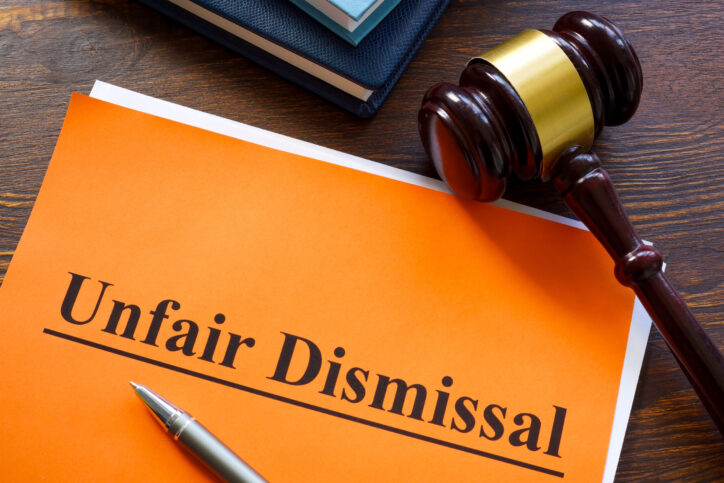On March 7, 2024, the Fair Work Commission (FWC) handed down a decision in an unfair dismissal claim where the employee had been terminated due to numerous missed deadlines, unauthorised absences, unsatisfactory work and negative client feedback.
Our employee relations experts examine the case and what it means for businesses.

Case facts
The applicant, Craig Perkins, commenced full-time employment as a painter with iFab Steel Pty Ltd on February 17, 2023. He was subsequently terminated on November 6, 2023.
Leading up to the dismissal, Mr Perkins attended work on October 30, 2023, completing an 11-hour shift. He also attended work for one hour the following day. However, he did not turn up for work on November 2, 2023, and upon his return on November 6, 2023, he was terminated.
During the case, iFab Steel provided the following evidence which formed the basis of the decision to terminate;
- Not turning up to work, without explanation, on multiple occasions;
- For the period between May 15, 2023, and June 1, 2023, Mr Perkins did not turn up to work and did not provide an explanation. Mr Perkins stated that he had taken the time off to care for a family member who had gone through surgery, however it remained that he had not provided any application for leave.
- Incorrect application of paint on a project, incurring the company a $7,000 bill to rectify. It was also alleged that he was caught sleeping in a vehicle during the project, and that he was absent for six hours collecting items, which should have taken only two hours.
- After an incident, Mr Perkins left the workplace and was absent for four weeks. He returned with no explanation.
- A two-week delay on another project, where Mr Perkins allegedly accessed the site without authorisation and the police was nearly called by the client. It was also stated that Mr Perkins had been aggressive towards management and did not follow directions.
- A client complaint stating that Mr Perkins had covered new carpets and the entire house with spray paint due to lack of care, inability to follow instructions and poor workmanship.
- That Mr Perkins left work on November 1 without notifying the project manager and other employees. Mr Perkins submitted that he was contacted by phone by the manager and refused to return as he was fatigued. He also stated that he advised the manager he would not be able to work on November 2 as he needed to recover from the long shift. iFab disputed this.
- Mr Perkins swore at his manager during a phone call, then hung up and turned his phone off.
Mr Perkins returned to work on November 6 and was advised that there would be no further work offered to him. He was given an overview of his recent failures at work and his unacceptable language towards the manager, however Mr Perkins argued that he was not provided with a reason.
Mr Perkins submitted that there was no valid reason for his dismissal and there was no notification of any valid reason for his dismissal before the decision to terminate was made. He also submitted that he was not provided with an opportunity to respond.
The decision
When deciding whether a dismissal is harsh, unjust or unreasonable, the FWC must consider if there was a valid reason for it and if procedural fairness was offered.
In this case, the FWC was satisfied that there was a valid reason. Based on the evidence, Mr Perkins took extended periods of unauthorised leave, and there was evidence to support that Mr Perkins took considerably longer to complete work compared to others in a similar role. There was also evidence supporting a lack of quality in the work performed.
In terms of procedural fairness, the FWC stated that there were some flaws in the process. Whilst it was clear that Mr Perkins had been warned about his extended periods of unapproved absences, and been given opportunities to address his performance, there were concerns around the final day of attendance on November 6.
The FWC stated that the manager could have provided a more comprehensive reason for the dismissal. Similarly, there was no opportunity for Mr Perkins to either respond to the issues, or to bring a support person.
However, The FWC took into consideration other factors when making its decision, such as the fact that Mr Perkins’ employment was not long, and that iFab Steel had shown leniency throughout his employment. Further, Mr Perkins is currently receiving Workers’ Compensation, and will be fully incapacitated until June 2024, hence the financial impact of the dismissal was somewhat mitigated. It also considered that it was a new business and lacked a dedicated human resources specialist.
Ultimately, the FWC determined that the employee was not unfairly dismissed.
Key takeaways
When terminating an employee, it is important that there is a valid reason for termination and that procedural fairness has been afforded. In this case, the FWC showed some leniency with the process undertaken by the employer, however there have been instances where there was valid reason for termination, but the dismissal was deemed unfair due to factors related to procedural fairness.
The Fair Work Act 2009 (Cth) stipulates the following considerations that the FWC needs to make when determining if a dismissal is unfair:
- Was there a valid reason?
- Was the employee notified of that reason and given an opportunity to respond?
- Did the employer unreasonably refuse a support person?
- In matters of performance — had the employee been warned about their underperformance?
- Size of the employer and absence of human resources management
- Any other matters that the FWC considers relevant.
It is highly recommended that any managers, supervisors, HR professionals as well as any other employees who might undertake performance management processes within a business, receive appropriate training to ensure these processes are undertaken fairly, consistently and are documented appropriately. CCIWA’s “Managing the Poor Performer” is a full day course held every two months covering this area of HR. See here to find out more.
Due to the risks associated with terminating an employee, CCIWA strongly recommends that employers contact the Employee Relations Helpline on 08 (9365 7660) or via [email protected] to seek further advice prior to taking any action.












